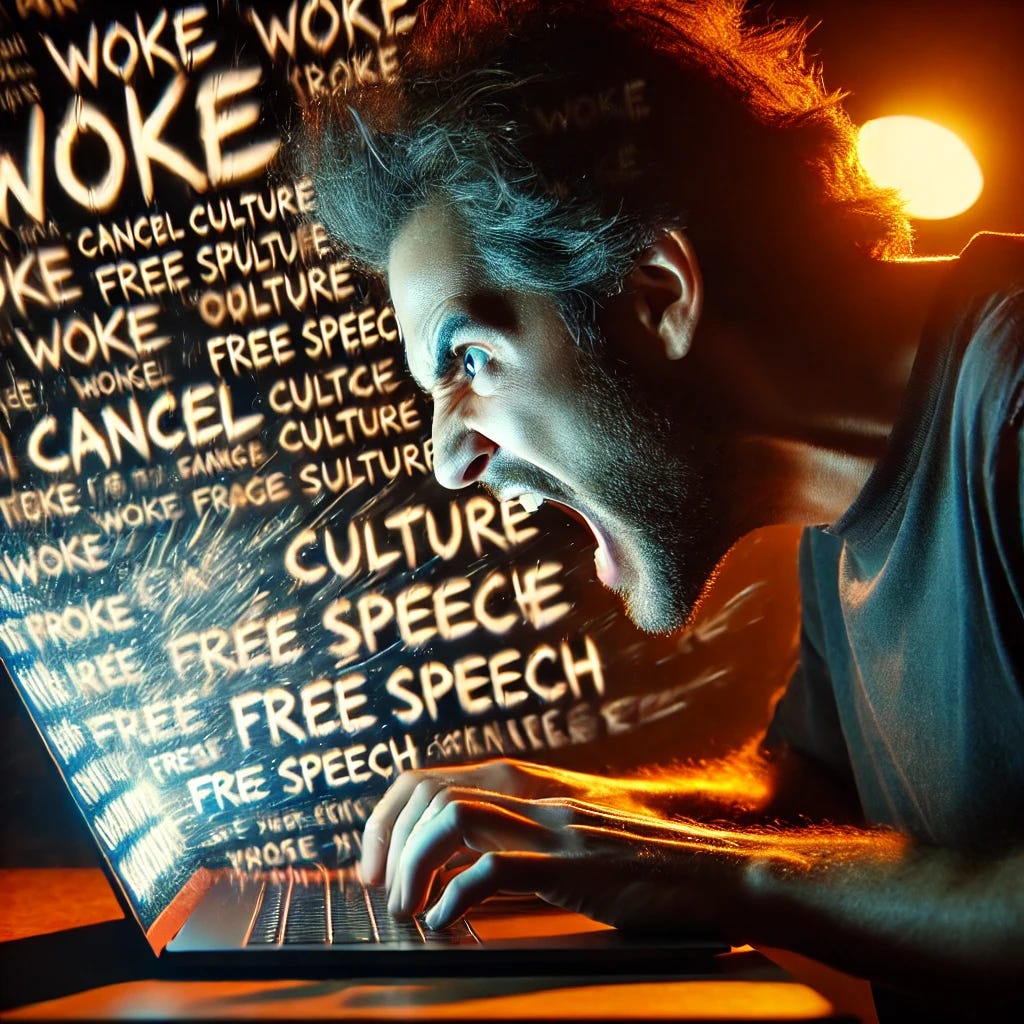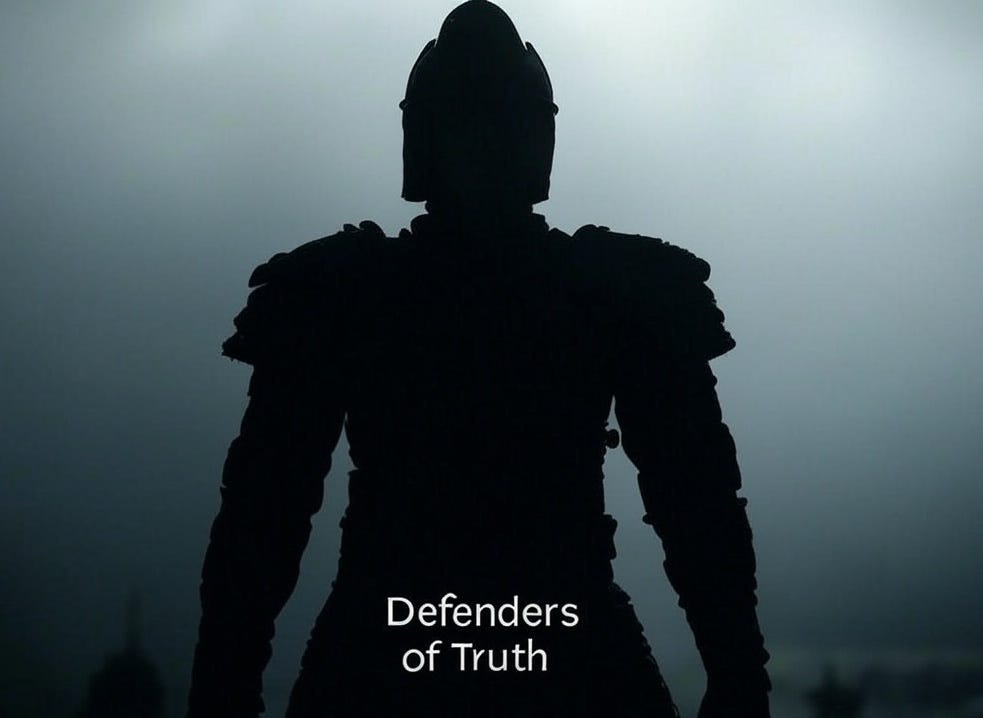The anti-woke warriors
In the midst of a perfect storm of language policing, grievance culture, puritan political correctness, intolerance, and borderline authoritarian behavior that demanded ideological compliance—a new type of warrior emerged to counteract the SJW types: “The anti-woke warrior.”
They were a necessary force—willing to risk their own standing by speaking and pushing back against the illiberalism dressed in progressive clothes, while many chose to remain silent, and worse, compliant.
But somehow, somewhere along the way “anti-woke” became its own kind of infectious ideology to many of those same people.
A number of them, as Helen Pluckrose points out in her essay, were merely anti-woke because of they didn’t like the ideas espoused the "woke” but, in fact, coveted the same level of authoritarian power to impose their own will. Eventually, the goalposts shifted. It became about power over principles. They were less concerned with resisting authoritarianism than figuring out how to seize power so they could wield it in the other direction. They didn’t want to dismantle the machinery of control—they just wanted to be the ones pulling the levers. Some have referred to them as the “woke right.” As Pluckrose notes, opposition to wokeness comes from many different ideological positions, each with its own agenda—ranging from evidence-based liberals to far-right authoritarians.
Still, a number were indeed fighting to preserve free expression, critical thought, and basic sanity, while simultaneously pushing back against illogical and dangerous ideas. It was about resisting an authoritarian moral orthodoxy that sought to punish deviation and dissent. But disagreements do not make someone a sinner. And supporting viewpoint diversity is not a crime. Plainly, these individuals were standing up for liberal values. Yet, in time, “anti-woke” became an identity in the same way that someone might consider themselves a SJW. It became a “them vs us” struggle, and on that battlefield they’ve turned to extremes as single-minded, self-righteous crusaders. Ironically, becoming similarly intolerant just as their “enemies” had been. They began to think in extremes, hardened their resolve, and banished nuance.
The “culture war,” as it had been dubbed, became their entire identity and they began to resemble the very thing they were fighting against. They were now reactionaries full of rage and vengeance. It became an all-consuming singular obsession. They may not have picked up the positions of the “woke” but they certainly did their behavior: pile-ons, name-calling, attacking, strawmanning, vilifying, et cetera. They began to ridicule people, rather than ideas. They claimed to stand for tolerance while acting intolerant towards differences in others. And they embraced their own sense of victimhood, while mocking that of their ideological opponents. In an increasingly black-and-white worldview, little room has been left for complexity, let alone self-reflection. In their own way, they became tribal too. It was the “anti-woke” tribe.
The thing about being the leader of a tribe built on emotionally-charged grievances is that its flock wants an endless supply of rage. Bread and circus, and half-truths. So over time, these culture warriors gave in more and more to their audience’s demands—many of whom just wanted to see someone “destroy” the left. On social media, there were endless posts making fun of woke people, often obscure individuals who had no power nor fame. DEI was blamed for just about any tragic occurrence, regardless of whether there was any evidence. Agreeing with something across enemy lines would be met with swift punishment. It was seen as a betrayal. In an uncertain world, the flock demands certainty. Audience capture is a potent thing and it’s difficult to escape when you’ve isolated yourself in an echo chamber where dissenting voices are demonized.
For some, it became more than just a fight or tribe, it became the very source of their livelihood. Now that the anti-woke are in power and are toppling policy after policy while enforcing their own brand of control, I wonder what their role will look like. Will they be cheerleaders, or critics?
The problem is that the culture warriors began to define themselves by what they oppose more than what they stood for. It was grounded in resentment rather than hope. Grievances more than solutions. What started as a passion that spurred them to challenge authoritarianism gradually eroded their capacity for empathy and dialogue. The perpetual conflict and state of ‘fight or flight’ broke them in a way, transforming them into a caricature of themselves. The discourse imprisoned them rather than freeing them.
And what impact did this have on a cultural level? On the one hand, it helped shift the Overton window. They were voicing things that many people were thinking but felt too scared to say. But it also created its own counterreaction. Instead of meeting people where they were, they were attacking them. That rarely changes minds.
Certainly, amongst the so-called “woke” there are plenty of radicals. But they are not the majority. Most of the people who had aligned with the beliefs being pushed at them did it because of a misplaced sense of doing what’s right and what’s good. They wanted to be good. Perhaps there was also a lack of deeper understanding of their own positions. And often, extensive social pressure. What these people needed was an olive branch. Open dialogue. Not extreme rhetoric.
I know this because I’ve had countless conversations with people like that in real life and took the time to understand why they think what they do. Then I talked to them, without buzzwords, without ridicule. Yes, even the people with the pronouns and the purple hair. I refused to see them as mere caricatures, but rather as fellow human beings who arrived at their views for a reason. Sometimes those reasons were surprising. And sometimes my immediate judgement was entirely wrong. I approached them with curiosity rather than judgement and in almost every single instance, we reached an understanding. We didn’t always agree, but we agreed to disagree and not think worse of each other. And that’s a step in the right direction.
Even when it came to cancel culture, a lot of people simply didn’t understand the issue. They simply did not realize the scale of it and the types of minor incidents that have resulted in horrible damage to people’s lives, destroying them. I wrote a book, “No Apologies: How to Find and Free Your Voice in the Age of Outrage” to help people understand what was happening in the cultural moment, as well as the draconian policies creeping in around speech.
I prefer not to see myself as “anti-woke” but rather, pro-human. Being anti-something tends to turn you into a mirror image of the very thing you despise. Being pro-human is about protecting the freedoms, dignity, and individuality of all people, regardless of which ideological flag they fly.
Fighting an enemy, can turn us into something we might no longer respect. I say this as someone who noticed that change in my own self early on, but I didn’t like what stared back from the abyss at me. So, I recoiled.
Still, there are some who’ve remained good faith throughout all this. They’ve retained a commitment to principles over ideology, and stood by the premise of an open society where people could speak freely and where ideas could be debated without fear. They didn’t let themselves be audience captured and continued to invite a diverse group of people to their discourse, whether they agreed or not.
If we don’t want to risk losing our North Star, we must focus on what we stand for rather than only what we stand against. For me, that’s evidence-based reasoning, freedom of expression, authentic and respectful discourse, tolerance towards dissenting views, individual rights, and, well, curiosity.
Perhaps some of these resonate with you too.
☕️ You can also support my work by making a one-off donation via Buy Me a Coffee.







Thank you Catherine for your observations with which I almost totally agree. As a person who left the Democratic Party for the obvious reasons, and headed a bit to the Maga crowd. I was very very happy to have finally a place to rest my political head. However, I am of the Mind that addictive cult like Behavior never leaves and what I am seeing now is simply a transfer of Biden hatred into Trump loving but it is practically the same. Trump can do no wrong and if you should suggest that maybe he is overreaching a little you get slammed just as you did from the Democrats if you disliked biden. I have stopped pretty much reading my usual go to podcasts because the comment section which is now totally anti-woke and unequivocally pro-trump
has become as vicious and name calling as any I read on the other side. I thought I had finally found a sane and thoughtful group of people where I could rest but I fear I'm running into very much the same thing as I did during the Biden years.
Yes, I had to stop listening to Peter Boghossian because he looked to have mistaken an enemy of his enemy for a friend. Yes, hold your identity lightly, and when you look into yourself, see a positive force. For me, to be a scientific humanist, to be pro-human, means that I rely on abductive thinking (avoiding ideological thinking).
Sometimes I refer people who look to have equated a rejection of the authoritarian left as an acceptance of the authoritarian right to The Political Compass and the work of Bob Altemeyer and Leor Zmigrod.